Impact of Global Pandemic on Digital Transformation of Workplace: A Case Study of Balfour Beatty Construction Sector
VerifiedAdded on 2023/06/17
|9
|3035
|310
AI Summary
This research study aims to identify the impact of the global pandemic on accelerating the digital transformation of the workplace, with a case study of Balfour Beatty Construction Sector. It will discuss the concept of digital transformative workplace, its impact on organizational performance, key drivers of digital transformation, and ways to improve flexibility at the workplace.
Contribute Materials
Your contribution can guide someone’s learning journey. Share your
documents today.
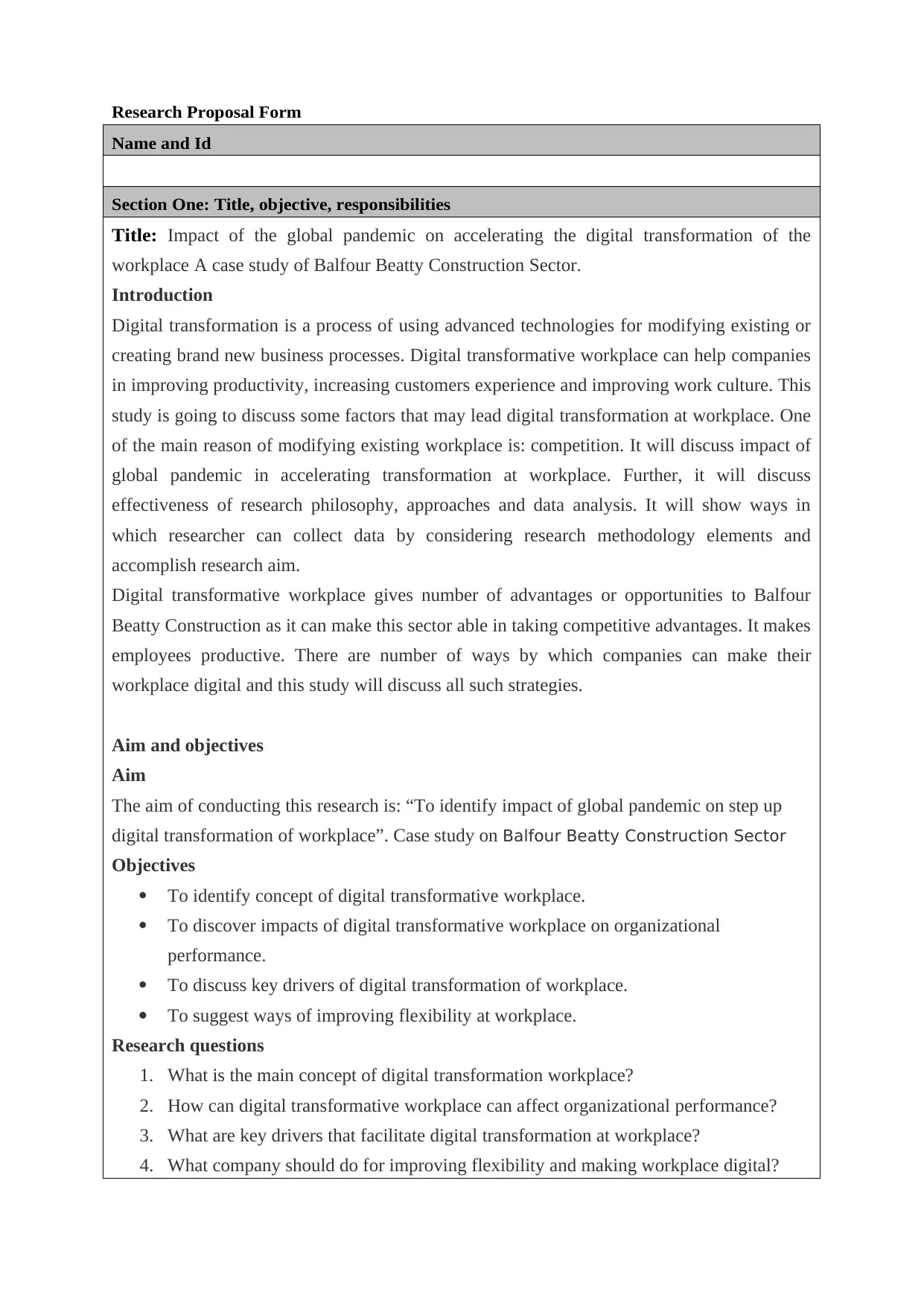
Research Proposal Form
Name and Id
Section One: Title, objective, responsibilities
Title: Impact of the global pandemic on accelerating the digital transformation of the
workplace A case study of Balfour Beatty Construction Sector.
Introduction
Digital transformation is a process of using advanced technologies for modifying existing or
creating brand new business processes. Digital transformative workplace can help companies
in improving productivity, increasing customers experience and improving work culture. This
study is going to discuss some factors that may lead digital transformation at workplace. One
of the main reason of modifying existing workplace is: competition. It will discuss impact of
global pandemic in accelerating transformation at workplace. Further, it will discuss
effectiveness of research philosophy, approaches and data analysis. It will show ways in
which researcher can collect data by considering research methodology elements and
accomplish research aim.
Digital transformative workplace gives number of advantages or opportunities to Balfour
Beatty Construction as it can make this sector able in taking competitive advantages. It makes
employees productive. There are number of ways by which companies can make their
workplace digital and this study will discuss all such strategies.
Aim and objectives
Aim
The aim of conducting this research is: “To identify impact of global pandemic on step up
digital transformation of workplace”. Case study on Balfour Beatty Construction Sector
Objectives
To identify concept of digital transformative workplace.
To discover impacts of digital transformative workplace on organizational
performance.
To discuss key drivers of digital transformation of workplace.
To suggest ways of improving flexibility at workplace.
Research questions
1. What is the main concept of digital transformation workplace?
2. How can digital transformative workplace can affect organizational performance?
3. What are key drivers that facilitate digital transformation at workplace?
4. What company should do for improving flexibility and making workplace digital?
Name and Id
Section One: Title, objective, responsibilities
Title: Impact of the global pandemic on accelerating the digital transformation of the
workplace A case study of Balfour Beatty Construction Sector.
Introduction
Digital transformation is a process of using advanced technologies for modifying existing or
creating brand new business processes. Digital transformative workplace can help companies
in improving productivity, increasing customers experience and improving work culture. This
study is going to discuss some factors that may lead digital transformation at workplace. One
of the main reason of modifying existing workplace is: competition. It will discuss impact of
global pandemic in accelerating transformation at workplace. Further, it will discuss
effectiveness of research philosophy, approaches and data analysis. It will show ways in
which researcher can collect data by considering research methodology elements and
accomplish research aim.
Digital transformative workplace gives number of advantages or opportunities to Balfour
Beatty Construction as it can make this sector able in taking competitive advantages. It makes
employees productive. There are number of ways by which companies can make their
workplace digital and this study will discuss all such strategies.
Aim and objectives
Aim
The aim of conducting this research is: “To identify impact of global pandemic on step up
digital transformation of workplace”. Case study on Balfour Beatty Construction Sector
Objectives
To identify concept of digital transformative workplace.
To discover impacts of digital transformative workplace on organizational
performance.
To discuss key drivers of digital transformation of workplace.
To suggest ways of improving flexibility at workplace.
Research questions
1. What is the main concept of digital transformation workplace?
2. How can digital transformative workplace can affect organizational performance?
3. What are key drivers that facilitate digital transformation at workplace?
4. What company should do for improving flexibility and making workplace digital?
Secure Best Marks with AI Grader
Need help grading? Try our AI Grader for instant feedback on your assignments.
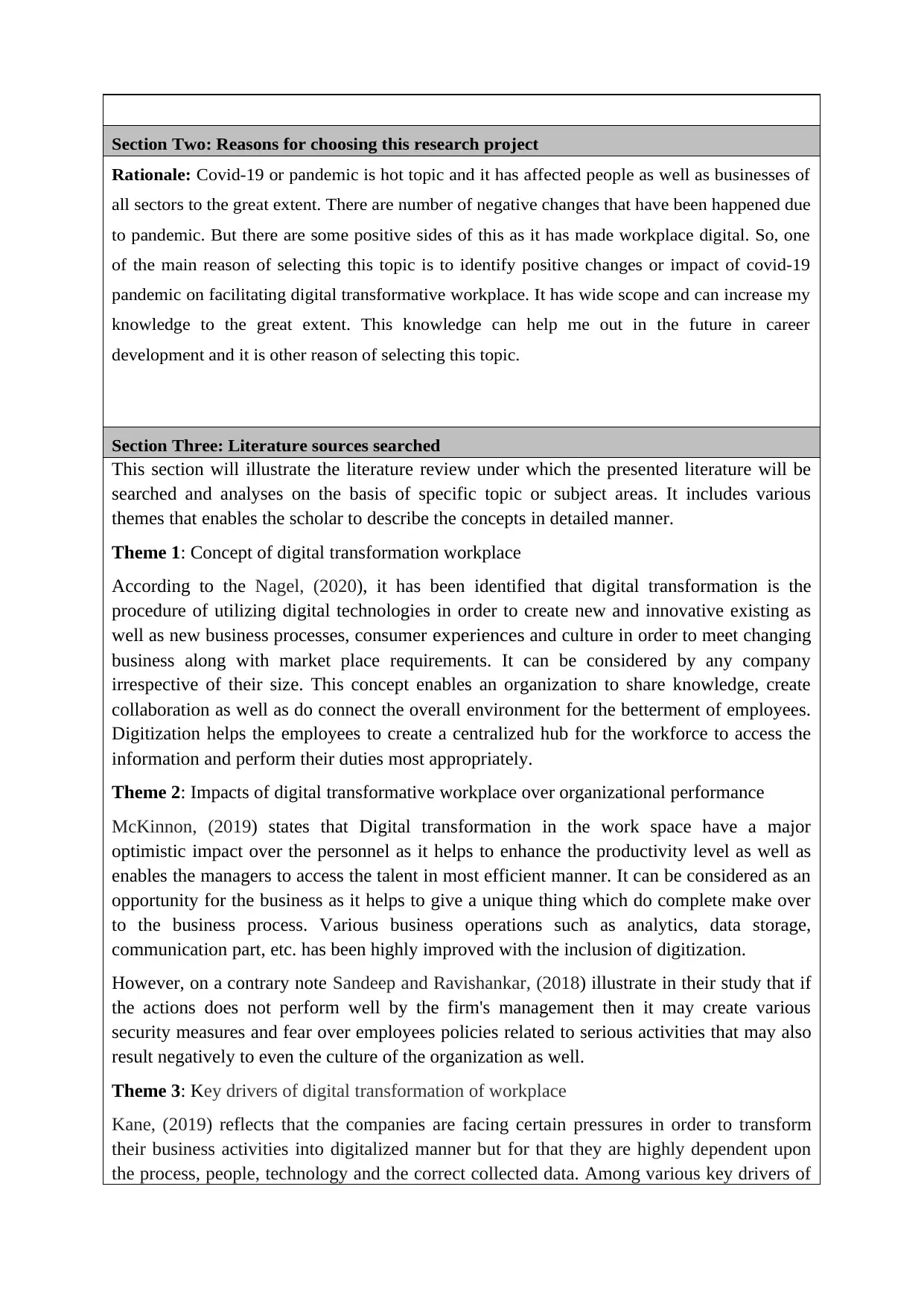
Section Two: Reasons for choosing this research project
Rationale: Covid-19 or pandemic is hot topic and it has affected people as well as businesses of
all sectors to the great extent. There are number of negative changes that have been happened due
to pandemic. But there are some positive sides of this as it has made workplace digital. So, one
of the main reason of selecting this topic is to identify positive changes or impact of covid-19
pandemic on facilitating digital transformative workplace. It has wide scope and can increase my
knowledge to the great extent. This knowledge can help me out in the future in career
development and it is other reason of selecting this topic.
Section Three: Literature sources searched
This section will illustrate the literature review under which the presented literature will be
searched and analyses on the basis of specific topic or subject areas. It includes various
themes that enables the scholar to describe the concepts in detailed manner.
Theme 1: Concept of digital transformation workplace
According to the Nagel, (2020), it has been identified that digital transformation is the
procedure of utilizing digital technologies in order to create new and innovative existing as
well as new business processes, consumer experiences and culture in order to meet changing
business along with market place requirements. It can be considered by any company
irrespective of their size. This concept enables an organization to share knowledge, create
collaboration as well as do connect the overall environment for the betterment of employees.
Digitization helps the employees to create a centralized hub for the workforce to access the
information and perform their duties most appropriately.
Theme 2: Impacts of digital transformative workplace over organizational performance
McKinnon, (2019) states that Digital transformation in the work space have a major
optimistic impact over the personnel as it helps to enhance the productivity level as well as
enables the managers to access the talent in most efficient manner. It can be considered as an
opportunity for the business as it helps to give a unique thing which do complete make over
to the business process. Various business operations such as analytics, data storage,
communication part, etc. has been highly improved with the inclusion of digitization.
However, on a contrary note Sandeep and Ravishankar, (2018) illustrate in their study that if
the actions does not perform well by the firm's management then it may create various
security measures and fear over employees policies related to serious activities that may also
result negatively to even the culture of the organization as well.
Theme 3: Key drivers of digital transformation of workplace
Kane, (2019) reflects that the companies are facing certain pressures in order to transform
their business activities into digitalized manner but for that they are highly dependent upon
the process, people, technology and the correct collected data. Among various key drivers of
Rationale: Covid-19 or pandemic is hot topic and it has affected people as well as businesses of
all sectors to the great extent. There are number of negative changes that have been happened due
to pandemic. But there are some positive sides of this as it has made workplace digital. So, one
of the main reason of selecting this topic is to identify positive changes or impact of covid-19
pandemic on facilitating digital transformative workplace. It has wide scope and can increase my
knowledge to the great extent. This knowledge can help me out in the future in career
development and it is other reason of selecting this topic.
Section Three: Literature sources searched
This section will illustrate the literature review under which the presented literature will be
searched and analyses on the basis of specific topic or subject areas. It includes various
themes that enables the scholar to describe the concepts in detailed manner.
Theme 1: Concept of digital transformation workplace
According to the Nagel, (2020), it has been identified that digital transformation is the
procedure of utilizing digital technologies in order to create new and innovative existing as
well as new business processes, consumer experiences and culture in order to meet changing
business along with market place requirements. It can be considered by any company
irrespective of their size. This concept enables an organization to share knowledge, create
collaboration as well as do connect the overall environment for the betterment of employees.
Digitization helps the employees to create a centralized hub for the workforce to access the
information and perform their duties most appropriately.
Theme 2: Impacts of digital transformative workplace over organizational performance
McKinnon, (2019) states that Digital transformation in the work space have a major
optimistic impact over the personnel as it helps to enhance the productivity level as well as
enables the managers to access the talent in most efficient manner. It can be considered as an
opportunity for the business as it helps to give a unique thing which do complete make over
to the business process. Various business operations such as analytics, data storage,
communication part, etc. has been highly improved with the inclusion of digitization.
However, on a contrary note Sandeep and Ravishankar, (2018) illustrate in their study that if
the actions does not perform well by the firm's management then it may create various
security measures and fear over employees policies related to serious activities that may also
result negatively to even the culture of the organization as well.
Theme 3: Key drivers of digital transformation of workplace
Kane, (2019) reflects that the companies are facing certain pressures in order to transform
their business activities into digitalized manner but for that they are highly dependent upon
the process, people, technology and the correct collected data. Among various key drivers of
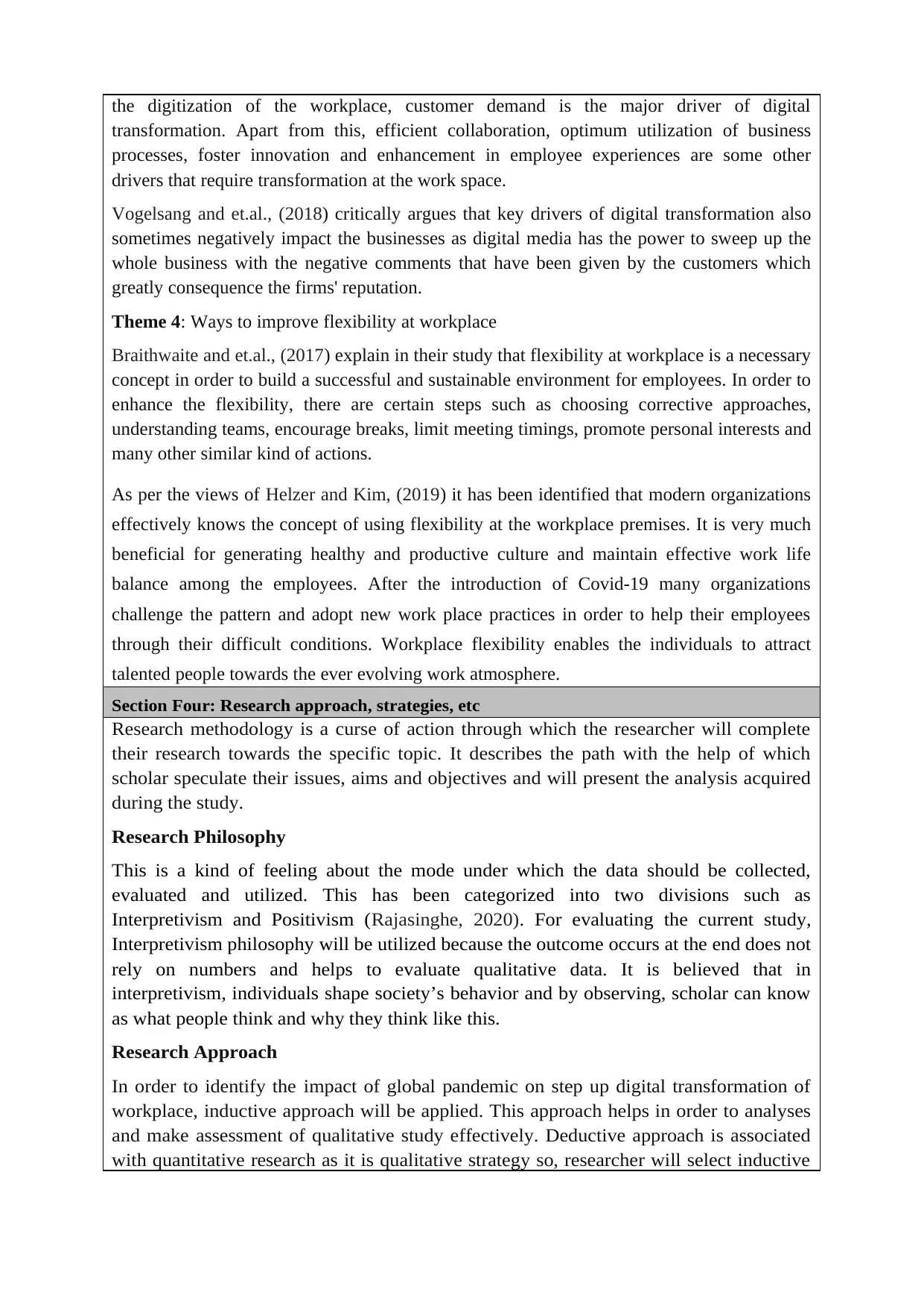
the digitization of the workplace, customer demand is the major driver of digital
transformation. Apart from this, efficient collaboration, optimum utilization of business
processes, foster innovation and enhancement in employee experiences are some other
drivers that require transformation at the work space.
Vogelsang and et.al., (2018) critically argues that key drivers of digital transformation also
sometimes negatively impact the businesses as digital media has the power to sweep up the
whole business with the negative comments that have been given by the customers which
greatly consequence the firms' reputation.
Theme 4: Ways to improve flexibility at workplace
Braithwaite and et.al., (2017) explain in their study that flexibility at workplace is a necessary
concept in order to build a successful and sustainable environment for employees. In order to
enhance the flexibility, there are certain steps such as choosing corrective approaches,
understanding teams, encourage breaks, limit meeting timings, promote personal interests and
many other similar kind of actions.
As per the views of Helzer and Kim, (2019) it has been identified that modern organizations
effectively knows the concept of using flexibility at the workplace premises. It is very much
beneficial for generating healthy and productive culture and maintain effective work life
balance among the employees. After the introduction of Covid-19 many organizations
challenge the pattern and adopt new work place practices in order to help their employees
through their difficult conditions. Workplace flexibility enables the individuals to attract
talented people towards the ever evolving work atmosphere.
Section Four: Research approach, strategies, etc
Research methodology is a curse of action through which the researcher will complete
their research towards the specific topic. It describes the path with the help of which
scholar speculate their issues, aims and objectives and will present the analysis acquired
during the study.
Research Philosophy
This is a kind of feeling about the mode under which the data should be collected,
evaluated and utilized. This has been categorized into two divisions such as
Interpretivism and Positivism (Rajasinghe, 2020). For evaluating the current study,
Interpretivism philosophy will be utilized because the outcome occurs at the end does not
rely on numbers and helps to evaluate qualitative data. It is believed that in
interpretivism, individuals shape society’s behavior and by observing, scholar can know
as what people think and why they think like this.
Research Approach
In order to identify the impact of global pandemic on step up digital transformation of
workplace, inductive approach will be applied. This approach helps in order to analyses
and make assessment of qualitative study effectively. Deductive approach is associated
with quantitative research as it is qualitative strategy so, researcher will select inductive
transformation. Apart from this, efficient collaboration, optimum utilization of business
processes, foster innovation and enhancement in employee experiences are some other
drivers that require transformation at the work space.
Vogelsang and et.al., (2018) critically argues that key drivers of digital transformation also
sometimes negatively impact the businesses as digital media has the power to sweep up the
whole business with the negative comments that have been given by the customers which
greatly consequence the firms' reputation.
Theme 4: Ways to improve flexibility at workplace
Braithwaite and et.al., (2017) explain in their study that flexibility at workplace is a necessary
concept in order to build a successful and sustainable environment for employees. In order to
enhance the flexibility, there are certain steps such as choosing corrective approaches,
understanding teams, encourage breaks, limit meeting timings, promote personal interests and
many other similar kind of actions.
As per the views of Helzer and Kim, (2019) it has been identified that modern organizations
effectively knows the concept of using flexibility at the workplace premises. It is very much
beneficial for generating healthy and productive culture and maintain effective work life
balance among the employees. After the introduction of Covid-19 many organizations
challenge the pattern and adopt new work place practices in order to help their employees
through their difficult conditions. Workplace flexibility enables the individuals to attract
talented people towards the ever evolving work atmosphere.
Section Four: Research approach, strategies, etc
Research methodology is a curse of action through which the researcher will complete
their research towards the specific topic. It describes the path with the help of which
scholar speculate their issues, aims and objectives and will present the analysis acquired
during the study.
Research Philosophy
This is a kind of feeling about the mode under which the data should be collected,
evaluated and utilized. This has been categorized into two divisions such as
Interpretivism and Positivism (Rajasinghe, 2020). For evaluating the current study,
Interpretivism philosophy will be utilized because the outcome occurs at the end does not
rely on numbers and helps to evaluate qualitative data. It is believed that in
interpretivism, individuals shape society’s behavior and by observing, scholar can know
as what people think and why they think like this.
Research Approach
In order to identify the impact of global pandemic on step up digital transformation of
workplace, inductive approach will be applied. This approach helps in order to analyses
and make assessment of qualitative study effectively. Deductive approach is associated
with quantitative research as it is qualitative strategy so, researcher will select inductive
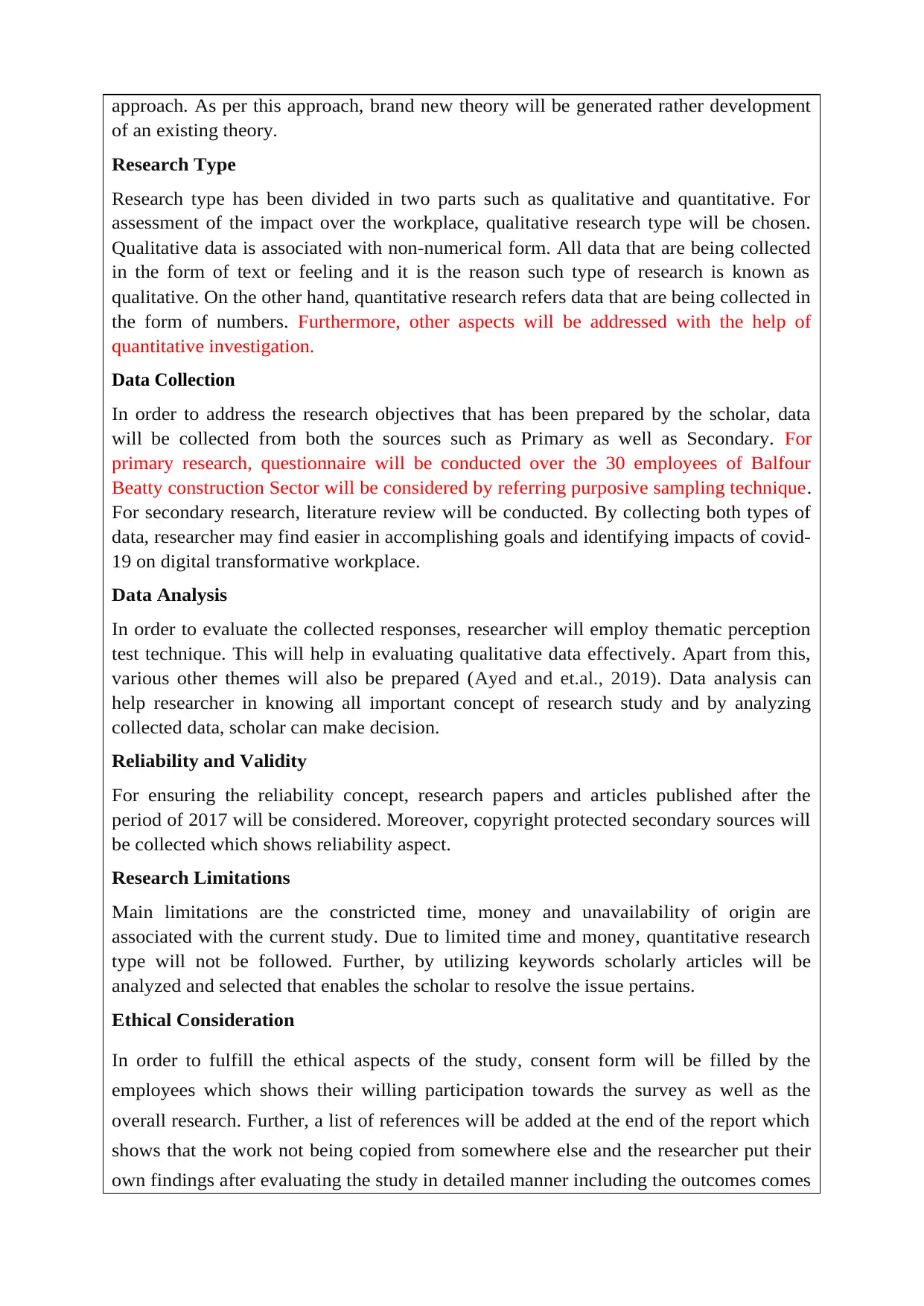
approach. As per this approach, brand new theory will be generated rather development
of an existing theory.
Research Type
Research type has been divided in two parts such as qualitative and quantitative. For
assessment of the impact over the workplace, qualitative research type will be chosen.
Qualitative data is associated with non-numerical form. All data that are being collected
in the form of text or feeling and it is the reason such type of research is known as
qualitative. On the other hand, quantitative research refers data that are being collected in
the form of numbers. Furthermore, other aspects will be addressed with the help of
quantitative investigation.
Data Collection
In order to address the research objectives that has been prepared by the scholar, data
will be collected from both the sources such as Primary as well as Secondary. For
primary research, questionnaire will be conducted over the 30 employees of Balfour
Beatty construction Sector will be considered by referring purposive sampling technique.
For secondary research, literature review will be conducted. By collecting both types of
data, researcher may find easier in accomplishing goals and identifying impacts of covid-
19 on digital transformative workplace.
Data Analysis
In order to evaluate the collected responses, researcher will employ thematic perception
test technique. This will help in evaluating qualitative data effectively. Apart from this,
various other themes will also be prepared (Ayed and et.al., 2019). Data analysis can
help researcher in knowing all important concept of research study and by analyzing
collected data, scholar can make decision.
Reliability and Validity
For ensuring the reliability concept, research papers and articles published after the
period of 2017 will be considered. Moreover, copyright protected secondary sources will
be collected which shows reliability aspect.
Research Limitations
Main limitations are the constricted time, money and unavailability of origin are
associated with the current study. Due to limited time and money, quantitative research
type will not be followed. Further, by utilizing keywords scholarly articles will be
analyzed and selected that enables the scholar to resolve the issue pertains.
Ethical Consideration
In order to fulfill the ethical aspects of the study, consent form will be filled by the
employees which shows their willing participation towards the survey as well as the
overall research. Further, a list of references will be added at the end of the report which
shows that the work not being copied from somewhere else and the researcher put their
own findings after evaluating the study in detailed manner including the outcomes comes
of an existing theory.
Research Type
Research type has been divided in two parts such as qualitative and quantitative. For
assessment of the impact over the workplace, qualitative research type will be chosen.
Qualitative data is associated with non-numerical form. All data that are being collected
in the form of text or feeling and it is the reason such type of research is known as
qualitative. On the other hand, quantitative research refers data that are being collected in
the form of numbers. Furthermore, other aspects will be addressed with the help of
quantitative investigation.
Data Collection
In order to address the research objectives that has been prepared by the scholar, data
will be collected from both the sources such as Primary as well as Secondary. For
primary research, questionnaire will be conducted over the 30 employees of Balfour
Beatty construction Sector will be considered by referring purposive sampling technique.
For secondary research, literature review will be conducted. By collecting both types of
data, researcher may find easier in accomplishing goals and identifying impacts of covid-
19 on digital transformative workplace.
Data Analysis
In order to evaluate the collected responses, researcher will employ thematic perception
test technique. This will help in evaluating qualitative data effectively. Apart from this,
various other themes will also be prepared (Ayed and et.al., 2019). Data analysis can
help researcher in knowing all important concept of research study and by analyzing
collected data, scholar can make decision.
Reliability and Validity
For ensuring the reliability concept, research papers and articles published after the
period of 2017 will be considered. Moreover, copyright protected secondary sources will
be collected which shows reliability aspect.
Research Limitations
Main limitations are the constricted time, money and unavailability of origin are
associated with the current study. Due to limited time and money, quantitative research
type will not be followed. Further, by utilizing keywords scholarly articles will be
analyzed and selected that enables the scholar to resolve the issue pertains.
Ethical Consideration
In order to fulfill the ethical aspects of the study, consent form will be filled by the
employees which shows their willing participation towards the survey as well as the
overall research. Further, a list of references will be added at the end of the report which
shows that the work not being copied from somewhere else and the researcher put their
own findings after evaluating the study in detailed manner including the outcomes comes
Secure Best Marks with AI Grader
Need help grading? Try our AI Grader for instant feedback on your assignments.
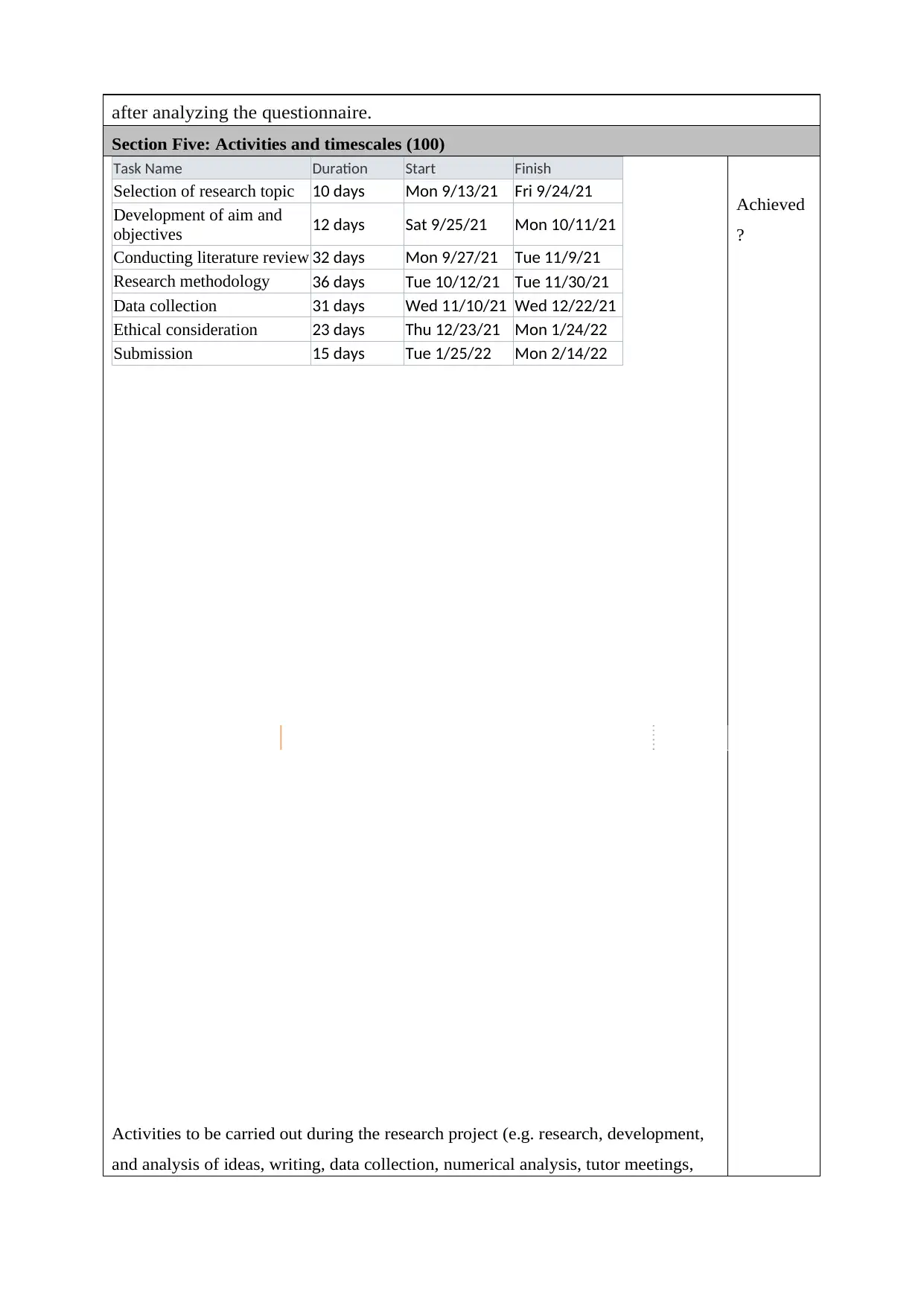
after analyzing the questionnaire.
Section Five: Activities and timescales (100)
Task Name Duration Start Finish
Selection of research topic 10 days Mon 9/13/21 Fri 9/24/21
Development of aim and
objectives 12 days Sat 9/25/21 Mon 10/11/21
Conducting literature review 32 days Mon 9/27/21 Tue 11/9/21
Research methodology 36 days Tue 10/12/21 Tue 11/30/21
Data collection 31 days Wed 11/10/21 Wed 12/22/21
Ethical consideration 23 days Thu 12/23/21 Mon 1/24/22
Submission 15 days Tue 1/25/22 Mon 2/14/22
Activities to be carried out during the research project (e.g. research, development,
and analysis of ideas, writing, data collection, numerical analysis, tutor meetings,
Achieved
?
Section Five: Activities and timescales (100)
Task Name Duration Start Finish
Selection of research topic 10 days Mon 9/13/21 Fri 9/24/21
Development of aim and
objectives 12 days Sat 9/25/21 Mon 10/11/21
Conducting literature review 32 days Mon 9/27/21 Tue 11/9/21
Research methodology 36 days Tue 10/12/21 Tue 11/30/21
Data collection 31 days Wed 11/10/21 Wed 12/22/21
Ethical consideration 23 days Thu 12/23/21 Mon 1/24/22
Submission 15 days Tue 1/25/22 Mon 2/14/22
Activities to be carried out during the research project (e.g. research, development,
and analysis of ideas, writing, data collection, numerical analysis, tutor meetings,
Achieved
?
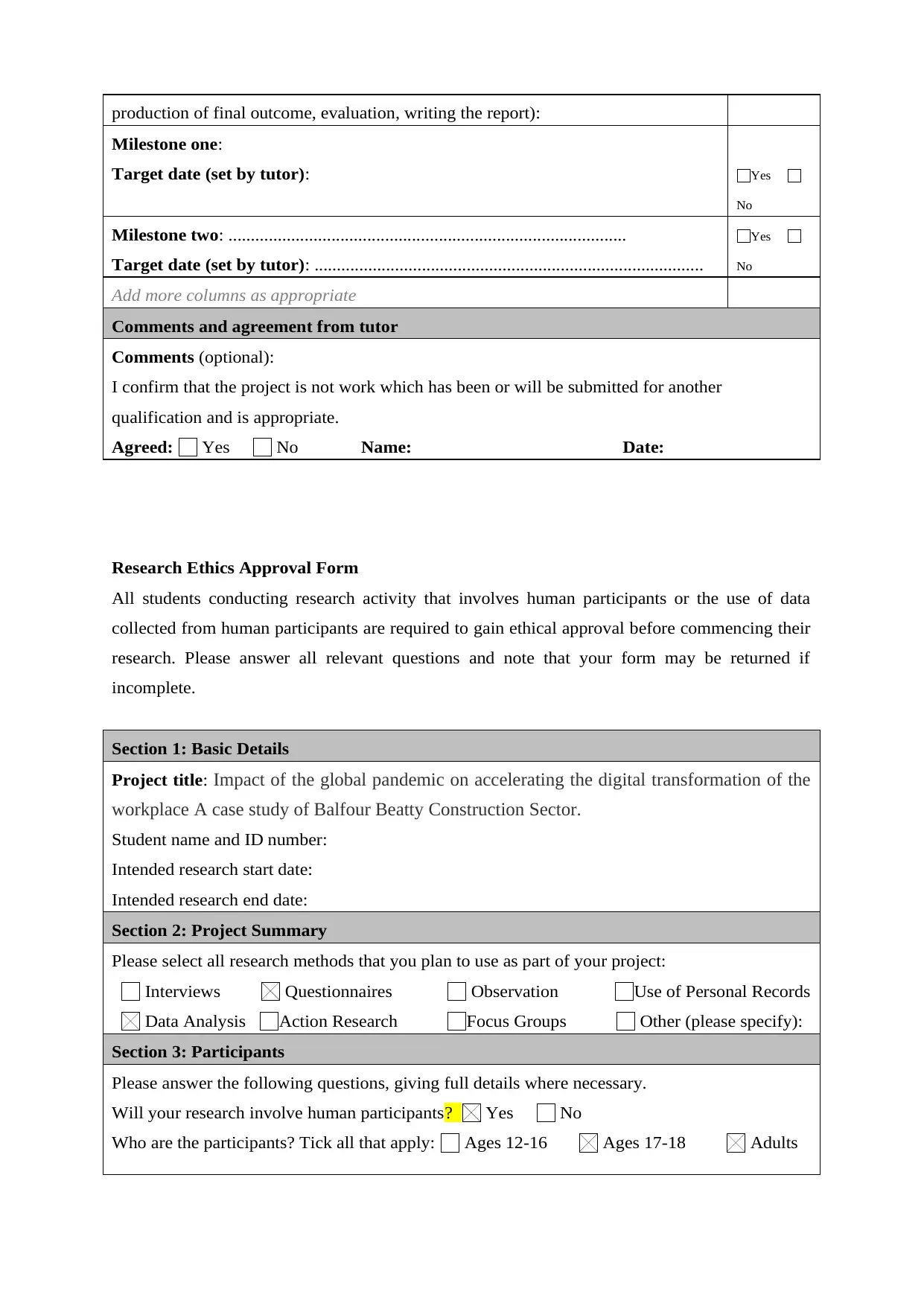
production of final outcome, evaluation, writing the report):
Milestone one:
Target date (set by tutor): Yes
No
Milestone two: .........................................................................................
Target date (set by tutor): .......................................................................................
Yes
No
Add more columns as appropriate
Comments and agreement from tutor
Comments (optional):
I confirm that the project is not work which has been or will be submitted for another
qualification and is appropriate.
Agreed: Yes No Name: Date:
Research Ethics Approval Form
All students conducting research activity that involves human participants or the use of data
collected from human participants are required to gain ethical approval before commencing their
research. Please answer all relevant questions and note that your form may be returned if
incomplete.
Section 1: Basic Details
Project title: Impact of the global pandemic on accelerating the digital transformation of the
workplace A case study of Balfour Beatty Construction Sector.
Student name and ID number:
Intended research start date:
Intended research end date:
Section 2: Project Summary
Please select all research methods that you plan to use as part of your project:
Interviews Questionnaires Observation Use of Personal Records
Data Analysis Action Research Focus Groups Other (please specify):
Section 3: Participants
Please answer the following questions, giving full details where necessary.
Will your research involve human participants? Yes No
Who are the participants? Tick all that apply: Ages 12-16 Ages 17-18 Adults
Milestone one:
Target date (set by tutor): Yes
No
Milestone two: .........................................................................................
Target date (set by tutor): .......................................................................................
Yes
No
Add more columns as appropriate
Comments and agreement from tutor
Comments (optional):
I confirm that the project is not work which has been or will be submitted for another
qualification and is appropriate.
Agreed: Yes No Name: Date:
Research Ethics Approval Form
All students conducting research activity that involves human participants or the use of data
collected from human participants are required to gain ethical approval before commencing their
research. Please answer all relevant questions and note that your form may be returned if
incomplete.
Section 1: Basic Details
Project title: Impact of the global pandemic on accelerating the digital transformation of the
workplace A case study of Balfour Beatty Construction Sector.
Student name and ID number:
Intended research start date:
Intended research end date:
Section 2: Project Summary
Please select all research methods that you plan to use as part of your project:
Interviews Questionnaires Observation Use of Personal Records
Data Analysis Action Research Focus Groups Other (please specify):
Section 3: Participants
Please answer the following questions, giving full details where necessary.
Will your research involve human participants? Yes No
Who are the participants? Tick all that apply: Ages 12-16 Ages 17-18 Adults
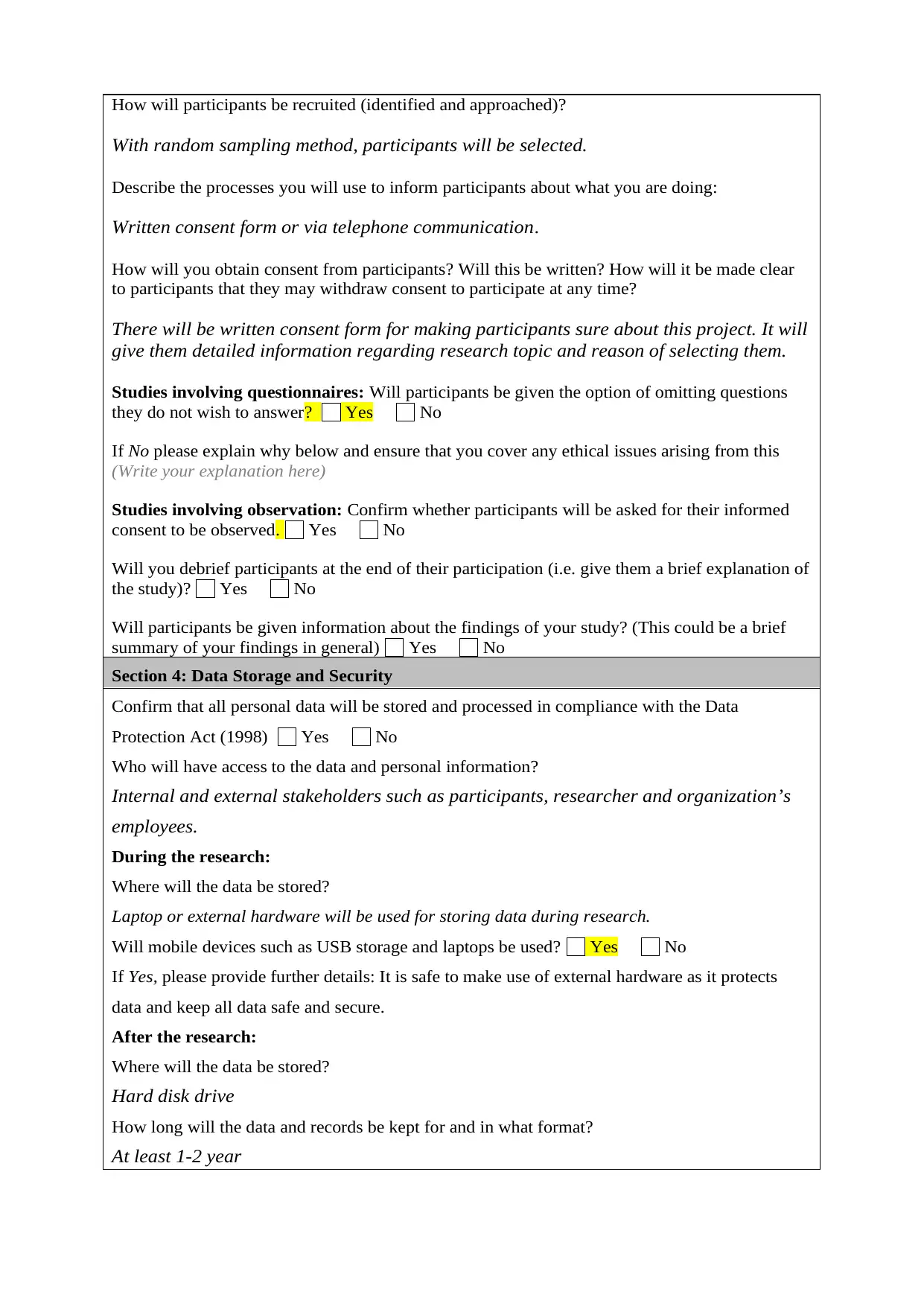
How will participants be recruited (identified and approached)?
With random sampling method, participants will be selected.
Describe the processes you will use to inform participants about what you are doing:
Written consent form or via telephone communication.
How will you obtain consent from participants? Will this be written? How will it be made clear
to participants that they may withdraw consent to participate at any time?
There will be written consent form for making participants sure about this project. It will
give them detailed information regarding research topic and reason of selecting them.
Studies involving questionnaires: Will participants be given the option of omitting questions
they do not wish to answer? Yes No
If No please explain why below and ensure that you cover any ethical issues arising from this
(Write your explanation here)
Studies involving observation: Confirm whether participants will be asked for their informed
consent to be observed. Yes No
Will you debrief participants at the end of their participation (i.e. give them a brief explanation of
the study)? Yes No
Will participants be given information about the findings of your study? (This could be a brief
summary of your findings in general) Yes No
Section 4: Data Storage and Security
Confirm that all personal data will be stored and processed in compliance with the Data
Protection Act (1998) Yes No
Who will have access to the data and personal information?
Internal and external stakeholders such as participants, researcher and organization’s
employees.
During the research:
Where will the data be stored?
Laptop or external hardware will be used for storing data during research.
Will mobile devices such as USB storage and laptops be used? Yes No
If Yes, please provide further details: It is safe to make use of external hardware as it protects
data and keep all data safe and secure.
After the research:
Where will the data be stored?
Hard disk drive
How long will the data and records be kept for and in what format?
At least 1-2 year
With random sampling method, participants will be selected.
Describe the processes you will use to inform participants about what you are doing:
Written consent form or via telephone communication.
How will you obtain consent from participants? Will this be written? How will it be made clear
to participants that they may withdraw consent to participate at any time?
There will be written consent form for making participants sure about this project. It will
give them detailed information regarding research topic and reason of selecting them.
Studies involving questionnaires: Will participants be given the option of omitting questions
they do not wish to answer? Yes No
If No please explain why below and ensure that you cover any ethical issues arising from this
(Write your explanation here)
Studies involving observation: Confirm whether participants will be asked for their informed
consent to be observed. Yes No
Will you debrief participants at the end of their participation (i.e. give them a brief explanation of
the study)? Yes No
Will participants be given information about the findings of your study? (This could be a brief
summary of your findings in general) Yes No
Section 4: Data Storage and Security
Confirm that all personal data will be stored and processed in compliance with the Data
Protection Act (1998) Yes No
Who will have access to the data and personal information?
Internal and external stakeholders such as participants, researcher and organization’s
employees.
During the research:
Where will the data be stored?
Laptop or external hardware will be used for storing data during research.
Will mobile devices such as USB storage and laptops be used? Yes No
If Yes, please provide further details: It is safe to make use of external hardware as it protects
data and keep all data safe and secure.
After the research:
Where will the data be stored?
Hard disk drive
How long will the data and records be kept for and in what format?
At least 1-2 year
Paraphrase This Document
Need a fresh take? Get an instant paraphrase of this document with our AI Paraphraser
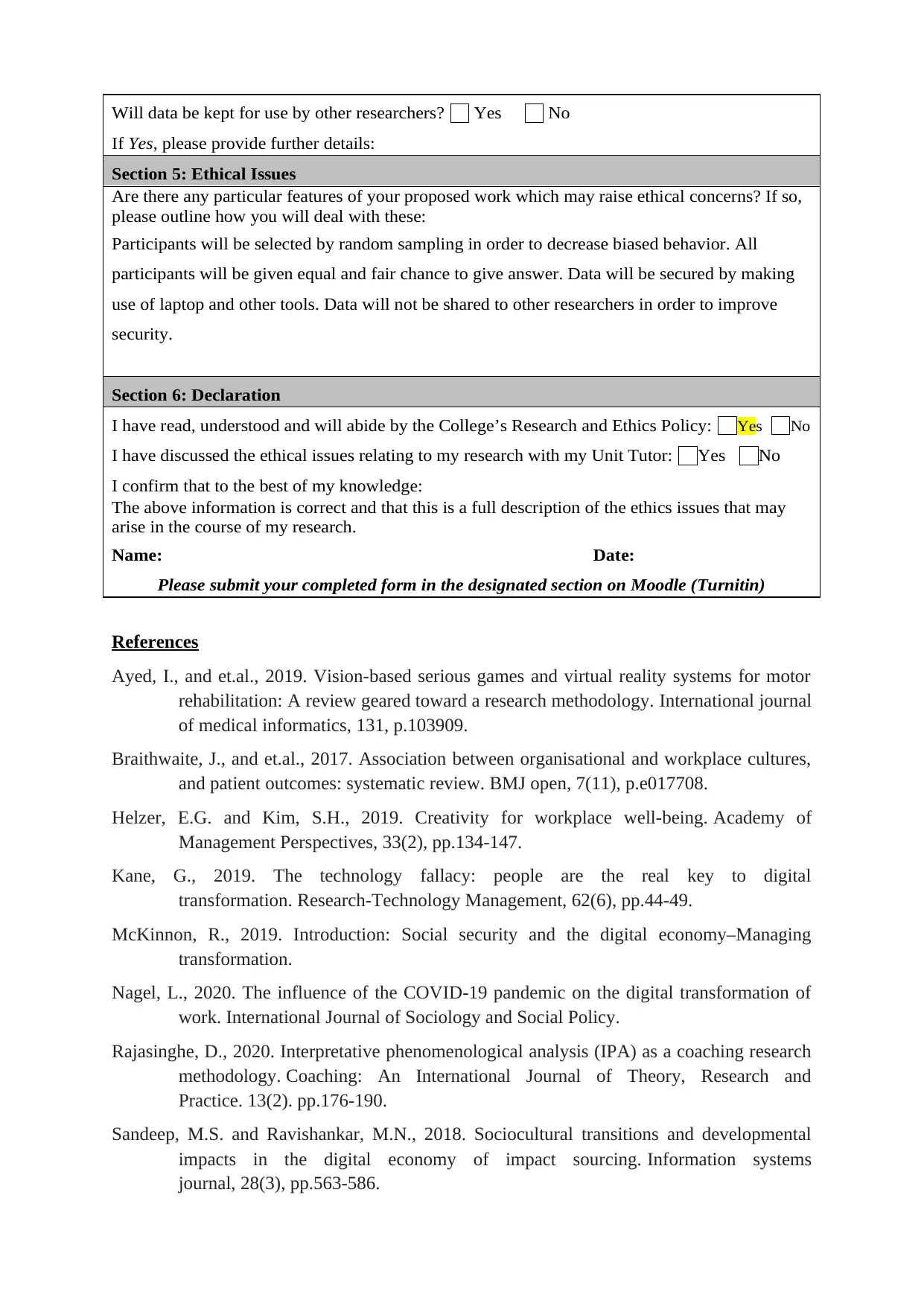
Will data be kept for use by other researchers? Yes No
If Yes, please provide further details:
Section 5: Ethical Issues
Are there any particular features of your proposed work which may raise ethical concerns? If so,
please outline how you will deal with these:
Participants will be selected by random sampling in order to decrease biased behavior. All
participants will be given equal and fair chance to give answer. Data will be secured by making
use of laptop and other tools. Data will not be shared to other researchers in order to improve
security.
Section 6: Declaration
I have read, understood and will abide by the College’s Research and Ethics Policy: Yes No
I have discussed the ethical issues relating to my research with my Unit Tutor: Yes No
I confirm that to the best of my knowledge:
The above information is correct and that this is a full description of the ethics issues that may
arise in the course of my research.
Name: Date:
Please submit your completed form in the designated section on Moodle (Turnitin)
References
Ayed, I., and et.al., 2019. Vision-based serious games and virtual reality systems for motor
rehabilitation: A review geared toward a research methodology. International journal
of medical informatics, 131, p.103909.
Braithwaite, J., and et.al., 2017. Association between organisational and workplace cultures,
and patient outcomes: systematic review. BMJ open, 7(11), p.e017708.
Helzer, E.G. and Kim, S.H., 2019. Creativity for workplace well-being. Academy of
Management Perspectives, 33(2), pp.134-147.
Kane, G., 2019. The technology fallacy: people are the real key to digital
transformation. Research-Technology Management, 62(6), pp.44-49.
McKinnon, R., 2019. Introduction: Social security and the digital economy–Managing
transformation.
Nagel, L., 2020. The influence of the COVID-19 pandemic on the digital transformation of
work. International Journal of Sociology and Social Policy.
Rajasinghe, D., 2020. Interpretative phenomenological analysis (IPA) as a coaching research
methodology. Coaching: An International Journal of Theory, Research and
Practice. 13(2). pp.176-190.
Sandeep, M.S. and Ravishankar, M.N., 2018. Sociocultural transitions and developmental
impacts in the digital economy of impact sourcing. Information systems
journal, 28(3), pp.563-586.
If Yes, please provide further details:
Section 5: Ethical Issues
Are there any particular features of your proposed work which may raise ethical concerns? If so,
please outline how you will deal with these:
Participants will be selected by random sampling in order to decrease biased behavior. All
participants will be given equal and fair chance to give answer. Data will be secured by making
use of laptop and other tools. Data will not be shared to other researchers in order to improve
security.
Section 6: Declaration
I have read, understood and will abide by the College’s Research and Ethics Policy: Yes No
I have discussed the ethical issues relating to my research with my Unit Tutor: Yes No
I confirm that to the best of my knowledge:
The above information is correct and that this is a full description of the ethics issues that may
arise in the course of my research.
Name: Date:
Please submit your completed form in the designated section on Moodle (Turnitin)
References
Ayed, I., and et.al., 2019. Vision-based serious games and virtual reality systems for motor
rehabilitation: A review geared toward a research methodology. International journal
of medical informatics, 131, p.103909.
Braithwaite, J., and et.al., 2017. Association between organisational and workplace cultures,
and patient outcomes: systematic review. BMJ open, 7(11), p.e017708.
Helzer, E.G. and Kim, S.H., 2019. Creativity for workplace well-being. Academy of
Management Perspectives, 33(2), pp.134-147.
Kane, G., 2019. The technology fallacy: people are the real key to digital
transformation. Research-Technology Management, 62(6), pp.44-49.
McKinnon, R., 2019. Introduction: Social security and the digital economy–Managing
transformation.
Nagel, L., 2020. The influence of the COVID-19 pandemic on the digital transformation of
work. International Journal of Sociology and Social Policy.
Rajasinghe, D., 2020. Interpretative phenomenological analysis (IPA) as a coaching research
methodology. Coaching: An International Journal of Theory, Research and
Practice. 13(2). pp.176-190.
Sandeep, M.S. and Ravishankar, M.N., 2018. Sociocultural transitions and developmental
impacts in the digital economy of impact sourcing. Information systems
journal, 28(3), pp.563-586.

Vogelsang, K., and et.al., 2018. Success factors for fostering a digital transformation in
manufacturing companies. Journal of Enterprise Transformation. 8(1-2). pp.121-
142.
manufacturing companies. Journal of Enterprise Transformation. 8(1-2). pp.121-
142.
1 out of 9
Related Documents
Your All-in-One AI-Powered Toolkit for Academic Success.
+13062052269
info@desklib.com
Available 24*7 on WhatsApp / Email
![[object Object]](/_next/static/media/star-bottom.7253800d.svg)
Unlock your academic potential
© 2024 | Zucol Services PVT LTD | All rights reserved.




